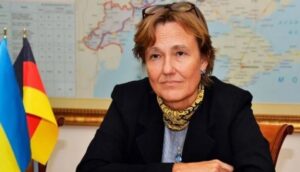
The volume of tractor imports to Ukraine in January 2026 amounted to $33.3 million, which is 24.2% less than in the same month of 2025 ($43.9 million), according to statistics from the State Customs Service.
According to the published statistics, tractor imports decreased by 2.5 times compared to December last year.
Last month, tractors were imported mainly from China (31.2% of total imports of this equipment, or $10.4 million), the United States (13.3%, or $4.4 million), and Germany (11.8%, or $3.9 million), while last year China was also the leader ($9.34 million), Germany was second ($5.5 million), and the United States was third ($3.7 million).
According to statistics from the State Customs Service, last month $0.4 million worth of tractors were exported, mainly to Belgium (31.8%), while last year exports amounted to $0.56 million, with most supplies going to Zambia (41.4%).
As reported, the volume of tractor imports to Ukraine in 2025 reached $845.7 million, exceeding the 2024 figure by 7.9%. The main suppliers were the United States ($179.7 million), Germany ($145 million), and China ($142.8 million). Exports amounted to $6.6 million, compared to $5.4 million in 2024, and were mainly to Romania, Belgium, and Germany.

Anka Feldhusen, German ambassador to Ukraine from July 2019 to July 2023, will take office as business ombudsman on February 1, 2026, replacing former Canadian ambassador to Ukraine Roman Waschuk, who was approved for the position by the Cabinet of Ministers of Ukraine on December 9, 2021, the Business Ombudsman Council announced on Facebook on Thursday.
The Cabinet of Ministers approved the decision of the Supervisory Board of the Business Ombudsman Council of November 25, 2025, to appoint Feldhusen by Order No. 9 of January 7, which is published on the government portal.
“I could not imagine a better successor than Anka Feldhusen. Her personal involvement in Ukraine since the mid-1990s, her comprehensive knowledge of government and business structures, and her empathy for the daily military (and other) challenges of Ukrainian life: I can only wish her and the renowned team of the Business Ombudsman Council continued success!” Vashchuk wrote on Facebook on Thursday.
The Business Ombudsman Council recalled that Feldhusen has considerable experience in diplomatic work in Ukraine, because before her appointment as ambassador in 2010-2015, she was deputy head of mission in Kyiv, and in 1994-1997 she headed the embassy’s press and protocol department.
In total, she has more than 30 years of experience working in the German Federal Foreign Office, and from 2016 to 2019, she served as head of department in the Administration of the German Federal President. From 2015 to 2016, she headed the regional department for East Africa, the Horn of Africa, and Sudan at the German Foreign Ministry. From 2002 to 2005, she was deputy head of mission in the Cuban capital, Havana.
Feldhusen speaks German (native), English, Ukrainian, French, Spanish, and Russian.
“It is a great honor for me to return to Ukraine as an advocate for the rights of entrepreneurs, whose resilience and determination support the country’s economy and defense capabilities in these difficult times. I believe that working to eliminate barriers and unfair practices on the part of state authorities is the basis for business development and attracting investors, despite the ongoing full-scale war,” the future business ombudsman commented on her appointment.
The Business Ombudsman Council (BOC) was established in accordance with the Memorandum of Understanding on the Ukrainian Anti-Corruption Initiative, signed in 2014 by the Ukrainian government, five business associations, the EBRD, and the OECD. Since 2015, the BOC has been operating as an independent permanent advisory and consultative body to the Cabinet of Ministers, with a team of more than 30 experts.
The council’s mission is to promote a transparent business environment by reviewing complaints from companies about violations or corruption by officials. The BOC, headed by the Business Ombudsman, acts as a neutral, extrajudicial mechanism and promotes constructive dialogue between business and government.
The BOC is funded by a Multilateral Donor Account managed by the European Bank for Reconstruction and Development (EBRD). Donors include Austria, Denmark, the EU, Finland, France, Germany, Italy, Japan, Latvia, the Netherlands, Norway, Poland, Sweden, Switzerland, the United Kingdom, and the United States.
Before Waschuk, the business ombudsman was former Warsaw Mayor Marcin Świecicki, appointed in 2019, and the first to hold this position in 2014 was Algirdas Šemeta, former Minister of Finance of Lithuania, European Commissioner for Budget and Financial Planning (2009-2010) and for taxation, customs union, audit, and anti-fraud (2010-2014).
As previously reported by Alexei Dolgikh, managing partner of Boyden Ukraine, a company specializing in the search for senior executives and selected by the EBRD to conduct the selection of a new business ombudsman, there were no Ukrainians among the candidates. “There were zero Ukrainian candidates for business ombudsman. They don’t believe in it,” Dolgikh said at the International Forum of Corporate Directors, held by the Professional Association of Corporate Governance (PACG) in early December 2025 in Kyiv.
Dolgikh told Interfax-Ukraine that three strong candidates had been selected, from which the Business Ombudsman Council made its final choice.
ANKA FELDHUSEN, Business Ombudsman, Former ambassador, GERMANY

According to the project Relocation.com.ua, Spain has become the largest “issuer” of first residence permits (first residence permits) in the European Union in 2024, followed by Germany and Poland, according to Eurostat data.
According to statistics, Spain issued 561.64 thousand first residence permits, Germany – 544.987 thousand, Poland – 488.846 thousand, Italy – 346.411 thousand, France – 342.208 thousand. European Commission
These five countries together accounted for 65.1% of all first residence permits issued in the EU in 2024. In total, EU countries issued 3.5 million first residence permits to non-EU citizens in 2024, 8.3% less than in 2023.
http://relocation.com.ua/spain-and-germany-lead-the-way-in-issuing-the-first-npi/

Germany has transferred the ninth IRIS-T air defense missile system to Ukraine, according to the Ukrainian Ministry of Defense.
“IRIS-T is a modern air defense missile system. It is manufactured by the German company Diehl Defense. The system is designed to destroy aircraft, helicopters, drones, and cruise missiles,” the ministry’s press service said in a statement.
It is noted that the high-tech IRIS-T missiles can maneuver quickly, hit targets both on head-on courses and during pursuit, and have highly sensitive infrared homing heads. They are capable of hitting modern aircraft, overcoming their defense systems, and distinguishing real targets from false ones.
Currently, two types of IRIS-T systems are in use: SLS – short range, range up to 12 km, altitude up to 8 km, and SLM – medium range, range up to 40 km, altitude up to 20 km.
The IRIS-T system can be integrated into Ukraine’s unified air defense system, where it works in conjunction with other air defense and missile defense systems.

In January-November 2025, Ukraine imported 44.18 thousand tons of coffee and 10.21 thousand tons of tea, which is 0.6% and 13.3% less than in the same period of 2024, according to the State Customs Service.
According to published statistics, in monetary terms, coffee imports increased by 39.2% to $352.18 million compared to $252.97 million for the same period a year earlier.
The main suppliers of coffee to Ukraine in the first 11 months of this year were Poland, which accounted for 15.5% of imports, or $54.67 million in monetary terms, Germany – 13.1% and $46.24 million, and Italy – 11.9% and $41.86 million.
A year earlier, the top three coffee suppliers to Ukraine for the corresponding period remained unchanged, except for their share in supplies: Poland (16.2%, $41.07 million), Italy (15.3%, $38.63 million), and Germany (13.1%, $33.09 million).
Tea imports during January-November 2025 decreased by 11.9% in monetary terms, to $38.92 million, compared to $44.19 million last year.
At the same time, the top three tea suppliers to Ukraine for the first 11 months of this year remained unchanged: Sri Lanka (30.3% or $11.8 million), Kenya (17.6% or $6.86 million), and China (12.5% or $4.85 million). Last year, these countries accounted for 31.6%, 20.1%, and 10.8% of the market, with tea supplies to Ukraine bringing them $13.96 million, $8.87 million, and $4.791 million, respectively.

In September 2025, there was an annual peak in the granting of temporary status to Ukrainian citizens in European Union countries, according to Eurostat.
“In October 2025, EU countries issued 74,175 new decisions on granting temporary protection. This is the second highest monthly figure in 2025 after the peak recorded in September (79,525). These high figures are the result of a decree by the Ukrainian government, adopted at the end of August 2025, which grants men aged 18 to 22 inclusive the right to leave Ukraine without hindrance,” the report says.
As of October 31, 2025, Ukrainian citizens accounted for more than 98.4% of those who received temporary protection in the EU. Adult women accounted for 43.8% of those who received temporary protection. Minors accounted for almost a third (30.8%), and adult men for just over a quarter (25.5%) of the total number
. As of October 31, 2025, a total of 4.3 million non-EU citizens who fled Ukraine had temporary protection status in the EU. Compared to the end of September 2025, the total number of persons from Ukraine under temporary protection decreased by 6,170 (-0.1%).
The EU countries that received the largest number of persons from Ukraine under temporary protection were Germany (1,229,960 persons; 28.6% of the total number in the EU), Poland (965,005; 22.5%), and the Czech Republic (393,005; 9.1%).
CZECH REPUBLIC, GERMANY, POLAND, TEMPORARY PROTECTION, UKRAINIANS